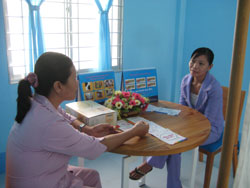Innovative model aids family health
Resource type: News
Viet Nam News | [ View Original Source (opens in new window) ]
by Thu Hang
 |
| A client attends a reproductive health and family planning consultation at Truong An Commune’s medical centre in the Cuu Long (Mekong) Delta Province of Vinh Long, which is part of the Government social franchise network Tinh chi em (Sisterhood). — VNA/VNS Photo Thu Hang |
VINH LONG — Anxiously entering a consulting room, Vo Thi Mai was hoping to receive professional advice on which contraceptive method was right for her.
The mother of two children reached a decision to choose birth control pills for breastfeeding moms after listening carefully to a consultant at a health station in Truong An Commune in the Cuu Long (Mekong) Delta Province of Vinh Long.
Mai, whose youngest child is three months old, said the consultant described all the birth control options and explained the advantages and disadvantages of each method.
“I could then decide which was best for me,” she said. “At first I wanted to use an intrauterine device but doctors advised me to use this for six months only after giving birth, for the sake of my health.”
“Officials at the station listened to my problems and gave me professional advice, which made me feel comfortable and satisfied,” she said.
The health station is near Mai’s house. “I did not have to wait in a long line at the provincial hospital,” she said.
Affordable, high-quality reproductive health and family planning services also benefited more than 2,000 local women aged 15-49 in the commune, said Tran Thi My Chau, consultant at the health station.
In 2010 the station joined the government’s social franchise network branded as Tinh chi em (Sisterhood), an innovative partial franchise model for public reproductive health and family planning services, resulting in improvement of service quality and client satisfaction, Chau said.
Poor quality health-care services at communes and low awareness among residents were blamed for a high rate of reproductive tract infections, sexually transmitted infections and abortions in rural areas, Chau added.
Social franchising is the grouping of service providers under a shared brand, to form a network of practitioners that offer standardised services.
A partial franchise enables the utilisation of existing public health system infrastructure in poor communes to increase delivery.
The project helped to upgrade infrastructure and medical equipment used for reproductive health and family planning services as well as offer training to improve knowledge and skills of medical officials at stations, she said.
To increase community awareness, reproductive healthcare and family planning knowledge is also widely disseminated to local residents.
The pilot project was launched in 2007 in Da Nang City and Khanh Hoa Province in central Viet Nam with funding from the US-based non-government organisation Atlantic Philanthropies (AP) and technical support from the UK-based non-government organisation Marie Stopes International Viet Nam (MSIVN), said Nguyen Thi Quy Linh, project manager.
It aims to strengthen the capacity of reproductive health and family planning services at commune health stations so that disadvantaged households are able to access high quality services at reasonable prices.
It also helps ease overloading at provincial hospitals as well as improve the quality of medical services offered by public health systems.
Between 2007 and 2009, a total of 76 commune health stations in the two provinces registered to be part of the network, Linh said.
The number of reproductive health and family planning consultations in franchised commune stations increased from 2,200 in 2007 to more than 12,000 in 2008.
The social franchise model was then scaled up to three provinces of Thai Nguyen, Thua Thien Hue and Vinh Long, with a total cost of nearly US$1.3 million funded by AP.
The 42-month project, scheduled to end in mid-2012, will admit 70 health stations in communes and districts in the three localities taking part in the network.
The European Community (EU) provided financial assistance of more than 542,000 euros to implement a three-year project to strengthen the capacity of government and non-government health service centres in the reproductive healthcare sector in central Thua Thien Hue and southern Vinh Long provinces, with the social franchise model.
The three-year project, which started in early 2010, targeted enrolling 60 public and private health centres at communes and districts in the two provinces as members of the network.
A total of 60,000 service cards, which allow cardholders to access reproductive health services not paid by health insurance, are expected to be handed out to women of child-bearing age at the targeted provinces.
Commune health stations form the basic unit of the health system, delivering primary care at the local level, said Huynh Huu Nghia, deputy director of Vinh Long Province’s Department of Health.
However, poor health care services have driven local residents to provincial hospitals, which were always overloaded, Nghia said.
The social franchise model has helped to create essential facilities and qualified medical officials to improve the quality of reproductive health services for disadvantaged households in rural areas, he added. — VNS
Ca Mau, Khanh Hoa, Thai Nguyen, Thua Thien Hue and Vinh Long Provincial Health Departments are Atlantic grantees.